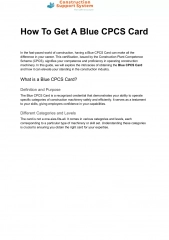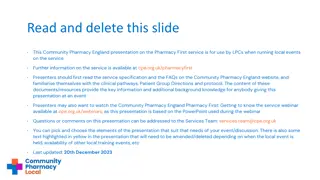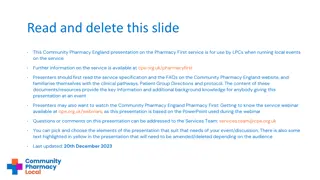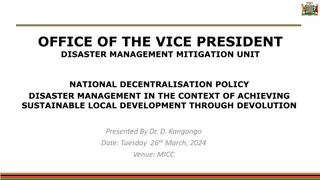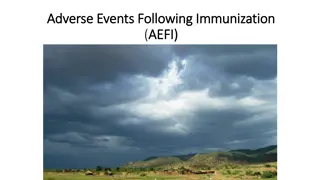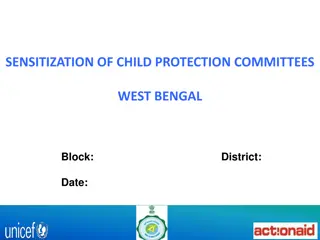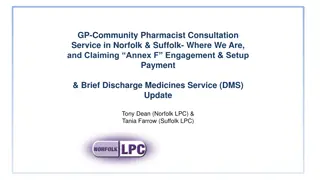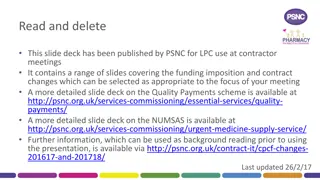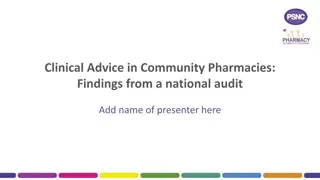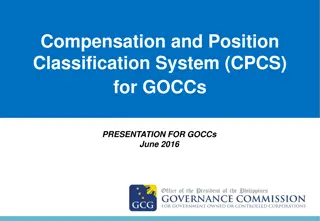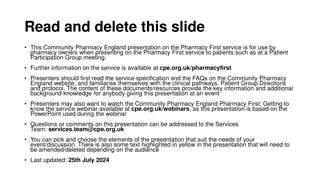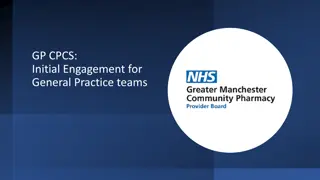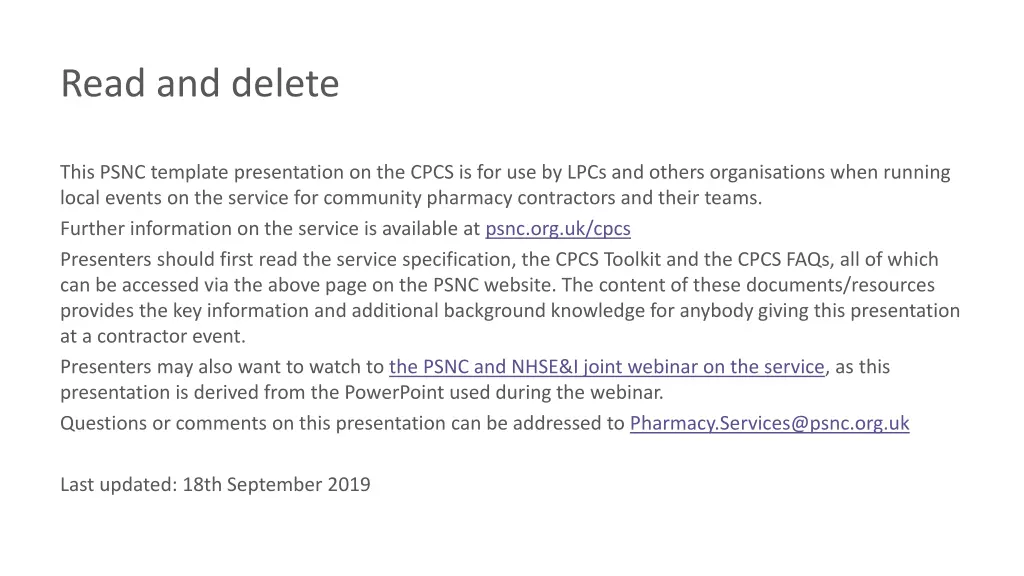
Understanding NHS Community Pharmacist Consultation Service (CPCS)
Explore the NHS Community Pharmacist Consultation Service (CPCS), a vital aspect of the 5-year Community Pharmacy Contractual Framework (CPCF). This presentation covers the service overview, patient flow, registration, IT requirements, training, funding, and more. Discover how the CPCS aids in relieving pressure on other healthcare services by offering consultations for lower acuity conditions and urgent repeat prescriptions. Stay informed about the strategic significance of implementing this service effectively for patients, NHS England and Improvement, Department of Health and Social Care, and the wider community pharmacy landscape.
Download Presentation

Please find below an Image/Link to download the presentation.
The content on the website is provided AS IS for your information and personal use only. It may not be sold, licensed, or shared on other websites without obtaining consent from the author. If you encounter any issues during the download, it is possible that the publisher has removed the file from their server.
You are allowed to download the files provided on this website for personal or commercial use, subject to the condition that they are used lawfully. All files are the property of their respective owners.
The content on the website is provided AS IS for your information and personal use only. It may not be sold, licensed, or shared on other websites without obtaining consent from the author.
E N D
Presentation Transcript
Read and delete This PSNC template presentation on the CPCS is for use by LPCs and others organisations when running local events on the service for community pharmacy contractors and their teams. Further information on the service is available at psnc.org.uk/cpcs Presenters should first read the service specification, the CPCS Toolkit and the CPCS FAQs, all of which can be accessed via the above page on the PSNC website. The content of these documents/resources provides the key information and additional background knowledge for anybody giving this presentation at a contractor event. Presenters may also want to watch to the PSNC and NHSE&I joint webinar on the service, as this presentation is derived from the PowerPoint used during the webinar. Questions or comments on this presentation can be addressed to Pharmacy.Services@psnc.org.uk Last updated: 18th September 2019
The NHS Community Pharmacist Consultation Service (CPCS)
Presentation overview Introduction Overview of the service and patient flow Registration to provide the service IT and record keeping Training and development Funding and payment claims Getting ready to provide the service Q&A
Introduction The 5-year CPCF sets out a clear vision for community pharmacy services, in line with proposals in the Community Pharmacy Forward View The CPCS is the most important service development within the 5-year agreement Implementing this service well has high importance /strategic importance to: Patients NHSE&I, DHSC and HMT Other healthcare professionals Community pharmacy
Introduction The NHS Community Pharmacist Consultation Service is the first clinical service of the new 5-year CPCF to be mobilised It is an Advanced service where patients contacting NHS 111 are referred to a community pharmacist for a consultation regarding lower acuity conditions or urgent repeat prescriptions The new service brings together the learning from the NUMSAS and DMIRS pilots into one service
Introduction Patients will be referred from NHS 111, following an assessment by a call advisor, when they would previously have been directed to a GP This releases capacity in other areas of the urgent care system such as A&E and general practices, freeing up capacity for the treatment of patients with higher acuity conditions Onward referrals may be necessary to other urgent care services or the patient s own GP
Introduction The service commences on 29th October 2019 In the pilots, patients liked the service and valued the consultation in a confidential environment The service will support: the integration of community pharmacy into the urgent care system increasing patient awareness of the role of community pharmacy as the first port of call for low acuity conditions and for medicines access and advice patients to self-manage their health more effectively
Development of the service Over the course of the 5-year CPCF, the service will be monitored and evaluated The range of symptom types included in the service will be reviewed to consider expansion, if safe, effective and it will improve patient experience By 2020/21, the learning from the GP CPCS pilots will be evaluated and a decision taken about whether to include streaming from general practice into the CPCS
Other CPCS pilots Online access for urgent medicines supply via CPCS is currently being tested across the north west via 111 Online A future pilot of a minor illness online pathway via 111 Online is under consideration These will be evaluated before consideration of national roll out
Service prerequisites Consultation room From 1st April 2020, the pharmacy must have IT equipment accessible within the consultation room NHS Summary Care Record (SCR) access Shared NHSmail account: nhspharmacy.location.pharmacynameODScode@nhs.net Up to date Directory of Services (DoS) details Access to the CPCS IT system provided by NHSE&I SOP including key contact details Update to your business continuity plan
The Directory of Services and CPCS DoS is a web-based database of health and social care services, e.g. GPs, pharmacies, A&E Every pharmacy has one DoS entry for its core/standard service provision extra entries for other services such as CPCS DoS integrates with NHS Pathways the clinical assessment tool used by NHS 111 call advisers to give access to real time information about services
The Directory of Services and the CPCS The assessment by the call adviser gathers information that identifies the specific clinical skills and defined timescale needed by the patient At the end of the assessment (if an emergency ambulance is not required), an automatic search is carried out on the DoS to locate an appropriate service in the patient s local area that offers the clinical skills needed within the timeframe required
The Directory of Services and the CPCS DoS will automatically identify when a pharmacy is due to close and will not select a pharmacy that is due to close within 30 minutes of sending a referral However, if a patient can wait until your pharmacy is open, the referral may be sent when your pharmacy is closed for you to process once the pharmacy is open Referrals from NHS 111 will not contain medication details as the call advisors are not clinically trained e.g. call advisers will not identify if the request is for a Controlled Drug
The Directory of Services and the CPCS It is critical that the information on DoS is accurate to allow NHS 111 to refer patients appropriately to community pharmacies Contractors can ensure their DoS information is up-to- date by using the DoS Profile Updater This should include Bank holiday opening hours
Patient calls NHS 111 or IUC CAS with a request for medicine or appliance The Call may be transferred to a clinician or handled by a call advisor. (N.B. Call advisors are non-clinical) CPCS Urgent medicines patient flow Patient triaged to Community Pharmacy Patient offered choice of 2 community pharmacies providing CPCS. Ideally the patient must be able to attend in the pharmacy in person. Telephone number of the pharmacy given to the patient by NHS 111 or IUC CAS And advised to phone pharmacy within 30 minutes Message sent to Community Pharmacy electronically Sent via the CPCS IT system* (NHSmail to be used as a backup in case of system failure) Pharmacy hasn t received referral? Pharmacy checks IT system Pharmacist phones NHS 111 (N.B. Patient not asked to contact 111) Patient telephones the pharmacy Assessment of request and ability to attend pharmacy Patient doesn t contact The pharmacy? Pharmacy makes one attempt to contact the patient as a minimum. Emergency Supply to be made Pharmacist assessment that supply required and is legal No Supply Pharmacist assessment that Emergency supply not required/ allowed or not possible Emergency Supply Patient (or representative) Attends pharmacy to complete supply Post Event Message to GP via CPCS IT system* Another reason for no supply EPS Rx dispensed Patient buys item Supply not necessary Supply not clinically appropriate Medicine/ appliance not stocked Forwarded onto a pharmacy With stock of item(s) required Referral to GP OOH Emergency Supply required but not possible for legal reason (e.g. controlled drugs) * CPCS IT system two providers at this time (PharmOutcomes and Sonar)
Patient calls NHS 111 or IUC CAS with a minor illness The call may be transferred to a clinician or handled by a call advisor. (N.B. Call advisors are non-clinical) CPCS Minor illness patient flow Patient triaged to Community Pharmacy Patient offered choice of 2 community pharmacies providing CPCS. Ideally the patient must be able to attend in the pharmacy in person. Telephone number of the pharmacy given to the patient by NHS 111 or IUC CAS And advised to phone pharmacy Message sent to Community Pharmacy electronically Sent via the CPCS IT system* (NHSmail to be used as a backup in case of system failure) Pharmacy hasn t received referral? Pharmacy checks IT system Pharmacist phones NHS 111 (N.B. Patient not asked to contact NHS 111) Patient doesn t contact the pharmacy? Pharmacy makes one attempt to contact the patient as a minimum. Patient telephones the pharmacy or attends in person USE ESCALATION PATHWAY IF PATIENT NEEDS HIGHER ACUITY CARE Pharmacist to call NHS 111 (Out of Hours service) OR Pharmacist consults with the patient & gives appropriate advice around self care and prevention Pharmacist MUST check NICE CKS to identify any risk factors Patient requires referral to a locally commissioned service The patient may often not require any medication. Self care advice is sufficient Patient requires OTC medication support & self care advice Patient requires higher acuity care escalate Support patient with urgent appointment at own GP (In hours service) OR Call 999 if more urgent Patient is supplied on a local MAS Patient can purchase an OTC medicine The Pharmacist will complete the consultation on the CPCS IT system* Pharmacist will supply any relevant patient information leaflets from www.nhs.uk Post Event Message to GP via CPCS IT system* Patient is always advised: IF SYMPTOMS DO NOT IMPROVE OR BECOME WORSE, THEN EITHER COME BACK TO SEE ME OR SEEK ADVICE FROM YOUR GP * CPCS IT system two providers at this time (PharmOutcomes and Sonar)
Registration to provide the service Previous registrations for NUMSAS or DMIRS will not carry forward The NUMSAS and DMIRS services will cease on 28th October and the CPCS starts on 29th October 2019 Registration is via the NHSBSA Manage Your Service (MYS) portal Pharmacies not currently using MYS will need to register see details on the PSNC website Contractors which have multiple pharmacies can use a bulk registration approach
Registration to provide the service Registration for the CPCS opened on 2nd September 2019 It includes a declaration for the pharmacy contractor regarding their readiness to provide the service
Setting new CPCS DoS entries active Once pharmacies are registered to provide the service, the local DoS team will be notified by the national DoS team (who receive regular updates from the NHSBSA) CPCS services will then be enabled on DoS and made live on 29th October 2019 at the inception of the service At the point of go-live, existing NUMSAS and DMIRS service entries will be switched off Following go-live, any pharmacies that subsequently register to provide the service will be made live by the local DoS team - this may take a few days to be completed 29th October
The CPCS IT system At present Sonar and PharmOutcomes are accredited to use ITK messaging The CPCF agreement document states: Subject to a value for money procurement outcome, the PhIF will be deployed to deliver the requisite IT functionality over 2019/20 and 2020/21. NHSE&I regional teams are working on procurement of this IT functionality
The CPCS IT system The systems will support: receipt of referrals from NHS 111 maintaining the clinical record of service provision printing EPS tokens (where required) sending post-event messages to patients general practices payment claims service management and evaluation IT equipment in the consultation room required from 1st April 2020 Contractors will have to purchase IT systems/functionality from April 2021
Checking the CPCS IT system The CPCS IT system must be checked regularly during opening hours to pick up referrals in a timely manner And the shared NHSmail mailbox must be checked when a pharmacy opens and before it closes each day When a pharmacy has received a referral, but not been contacted by the patient within 30 minutes (urgent medicines) or 12 hours (minor illness) the pharmacy must attempt to contact the patient If there is no contact from the patient the next day, the referral may be closed
Record keeping Where an urgent medicine/appliance supply is made, it must be recorded in: the POM register (if a POM) the CPCS IT system the PMR Where a CPCS consultation is for a minor illness, it must be recorded in: the CPCS IT system
Service availability and ongoing provision The service must be available throughout the pharmacy s full opening hours (i.e. core and supplementary) Temporary withdrawal from the service due to unforeseen circumstances must activate the relevant section in the business continuity plan The NHS 111 provider and local IUC CAS must be notified using the NHS DoS provider and commissioner helpline as soon as possible, to stop referrals being made to the pharmacy
Service availability and ongoing provision The local NHSE&I team must also be informed by the pharmacy contractor In the event of ongoing or repeated service issues, the local NHSE&I team may request the DoS team to stop referrals to the pharmacy until the issue is resolved Contractors who wish to stop providing the service must notify NHSE&I at least one month in advance via the MYS platform
Training and development The necessary knowledge and skills to provide the service are core competencies for all pharmacists, but pharmacists will want to ensure that they: - are able to explain the service to patients and carers - have an up to date understanding of the Human Medicines Regulations - are able to communicate with and advise patients appropriately and effectively on low acuity conditions - are able to assess the clinical needs of patients, including the identification of red flags - are able to act on the referrals received and make appropriate referrals to other NHS services and healthcare professionals
Training and development A CPCS self-assessment tool is available from CPPE to help pharmacists to assess their learning needs Continuing professional development sessions covering consultation and physical assessment skills will be available through CPPE from October 2019 these are not mandatory for service provision Health Education England will be commissioning further training in 2020, with funding from the Pharmacy Integration Fund
Reporting incidents and governance of the service Feedback on the CPCS should initially be shared with the local NHSE&I contract team who will co-ordinate ongoing review of the service, working with IUC representatives The pharmacy should report any incidents related to the referral process or operational issues with respect to the service to the NHS 111 provider and any local IUC CAS via the local health professionals line This feedback may be shared via the local Integrated Urgent Care governance group as part of an overview of the service and its performance
Reporting incidents and governance of the service This feedback may be used to manage how the service integrates with other local urgent care services This may include handling patients who use the service inappropriately and dealing with them on a system wide basis The pharmacy is required to report any patient safety incidents in line with the Clinical Governance Approved Particulars for pharmacies
Funding Transition payment supplement: sign up by 1st December - 900 sign up by 15th January - 600 commitment to provide the service until 31st March 2020 withdrawal before this date without good cause may lead to claw- back of some or all of the payment A Consultation fee of 14 will be paid for each completed referral No Consultation fee can be claimed where the pharmacist receives a referral, but cannot make any contact with the referred patient
Completed referrals For urgent medicines supply, a referral is completed when the pharmacist has a consultation with the patient (by telephone or face- to-face) and confirms no supply is required the patient is given advice the patient purchases the required product OTC the patient is referred on to another healthcare provider an EPS prescription is downloaded and dispensed an item is not available, and the patient is referred to a second pharmacy (both pharmacies can claim a consultation fee in this last scenario) For minor illness consultations, a referral is completed when the pharmacist has a consultation with the patient (telephone or face-to- face) and has provided advice to the patient
Reimbursement of medicines/appliance costs The cost of medicines or appliances supplied under the CPCS urgent supply provision (NOT the minor illness provision) will be reimbursed using the basic price specified in Drug Tariff No other elements of the Drug Tariff in relation to reimbursement of medicines or appliances apply to this service An allowance at the applicable VAT rate will be paid to cover the VAT incurred when purchasing the medicine or appliance The cost of medicines or appliances supplied via the service will be recharged to Clinical Commissioning Group budgets and all other costs will be paid by NHSE&I
Payment claims All payment claims will be managed through the MYS portal This will directly link with the CPCS IT system to help with the collation and submission of claims at the end of each month There is no paper-based claiming process for the service Only EPS tokens that record the patient declared exemption need to be created and sent to the NHSBSA as part of the contractor s monthly batch these should be separated from other tokens, and clearly marked as CPCS These will just be used for patient exemption accuracy checking
Promoting the service This service must not be actively promoted directly to the public by either the pharmacy contractor or the NHS However, promotion of community pharmacy as the first port of call for low acuity conditions will continue, e.g. via the Help Us Help You campaign
Getting ready to provide the service 1. Read and understand the Service Specification and the Toolkit 2. Make sure you understand the service flow and the role of the community pharmacy in urgent care 3. Create your SOP for the service, including key contact details (templates are available) 4. Ensure you have access to SCR, NHSmail and the CPCS IT system 5. Pharmacists - consider what CPD or refreshing of skills could help you provide the service the CPPE CPCS self-assessment tool can help you do this
Getting ready to provide the service 5. All pharmacy team members involved in provision of the service must be appropriately trained on the operation of the service. Consider: holding a briefing session for your team providing them with the one-page CPCS Service Overview on how the service will work (Annex A of the Toolkit) discussing as a team how you can work together to make the service a success making sure team members and locums are clear on the daily activity required, such as checking for referrals making sure team members and locums know how to identify a walk-in patient who may have been referred from NHS 111
Getting ready to provide the service 5. Consider locums ability to provide the service when making bookings it is of critical importance that locum and relief pharmacists are made aware that the pharmacy is providing the service before they work at the premises they MUST understand the service specification and SOP, and be able to provide the service they need to have SCR access and know how to use the CPCS IT system 6. Pharmacists consider registering for the CPD sessions when these are held in your area
Resources for pharmacy teams Service specification CPCS Toolkit including service overview implementation checklist Template SOP All resources can be accessed via psnc.org.uk/cpcs

